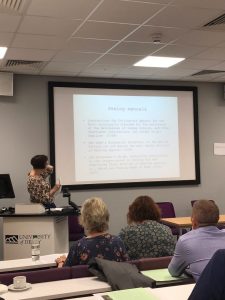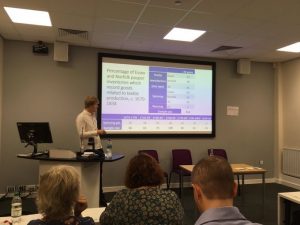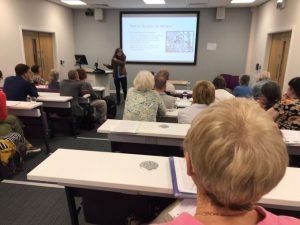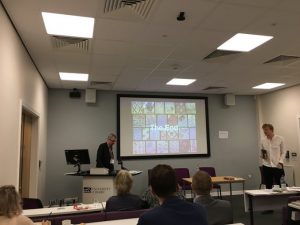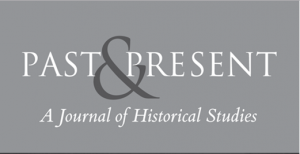by Dr. Joseph Harley (University of Derby)
On 12 September 2019, the University of Derby welcomed speakers and delegates for a conference on domestic work during the long eighteenth century. The event was sold out and papers discussed a wide range of themes, such as brewing, dairying, spinning, knitting and fuel use.
Our most detailed understanding of domestic production still comes from the study of the middling sort and elite, and much less research has been conducted on the domestic activities of poorer people. The conference sought to address this issue by bringing in a range of researchers who work on a wide range of topics. Through this, we were able to look at the home in a more holistic manner and develop a more comprehensive understanding of the relative importance of different types of domestic production and work in poor British households.
The event was very well received by delegates and received much praise. It was publicised on Twitter and used the hashtag #DomesticWorkDerby. Tweets from the conference have been assembled here.
O’Connell: Estimates of 13.5 million pairs of stockings per annum required in 1619 (3 new pairs each). #domesticworkderby
— Louise Falcini (@louisefalcini) September 12, 2019
The first panel was on domestic textile work and covered a wide chronology from the sixteenth to the nineteenth centuries. Lesley O’Connell Edwards’ (University of Oxford) paper discussed hand knitting between 1570 and 1700. She used a wide range of sources such as early-modern censuses and import data to come up with some new exciting estimates of the numbers employed in the industry. Ben Schneider’s (University of Oxford) paper discussed the rise and fall of hand spinning over the long eighteenth century. Through the novel use of spinning account books and data on imports, Ben found new empirical evidence which charts the productivity of spinning over the long eighteenth century. The talk ended by looking at the decline of spinning from technological improvements. The final paper of the session was given by Vivienne Richmond (Goldsmiths, University of London). She discussed Quaker charities and the giving of materials to poor recipients. Her research revealed that charities would often give materials to people who would then make their own garments.
The second session focused on inventories and their usefulness for investigating domestic production. Joseph Harley’s (University of Derby) paper introduced pauper inventories to the audience. The inventories capture the goods of people on poor relief and have never been used to analyse domestic work. By quantifying items connected to a range of activities such as brewing, dairying and spinning, the paper analysed changing participation in various forms of domestic production over the long eighteenth century. The applicability of de Vries’ industrious revolution concept was also analysed. Sebastian Keibek’s (University of Cambridge) talk analysed how useful probate inventories are for measuring male by-employment. He argued that the documents are flawed as it was generally the wives, children and servants of the men that were by-employed, not the husbands themselves.
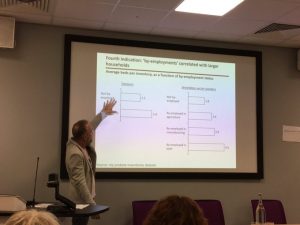
Sebastian Keibek presents research on inventories in domestic manufacture in the early modern period
The third session analysed food/fuel processing and domestic chores. Anistatia Miller (University of Bristol) spoke about brewing in the West Country. She analysed how the poor would make their own beer and run beer-houses from their own abodes. The paper also introduced important new estimates as to how common brewing was in the south-west and how many litres per annum were approximately brewed during the long eighteenth century. Philippa Parker (UEA) analysed the informal economies that people used to acquire domestic fuel in Norfolk. Using a wide range of sources such as maps and poor law records, she found that coal was not as important as many historians have suggested. Instead, the poor would source their own fuels (furze, peat, wood and dung) as alternatives. The final paper by Louise Falcini (University of Sussex) analysed laundry and how laborious the task was for women in the industry. It examined how laundry services were taken up by Londoners at all levels from the lowly servant to the affluent domestic household. Louise argued that these women became respectable members of their communities.
We ended the conference with a keynote paper from Professor John Styles (Caltech) entitled: ‘What were they spinning for? Textiles, the “domestic system” and household self-provisioning in England, 1600-1800’. His paper was fascinating and weaved together many of the themes that were discussed throughout the day. He started by critiquing concepts that historians have mis-used or ill-defined such as the ‘domestic system’, ‘factory system’ and ‘family system’, and then moved on to analyse how contemporaries saw textile work in Britain. Then, using new empirical findings he analysed how households divided their time between self-provisioning and production for the market. The paper was followed by a stimulating 30-minute discussion on many of the themes that John raised.
We ended the conference with a keynote paper from Professor John Styles (Caltech) entitled: ‘What were they spinning for? Textiles, the “domestic system” and household self-provisioning in England, 1600-1800’. His paper was fascinating and weaved together many of the themes that were discussed throughout the day. He started by critiquing concepts that historians have mis-used or ill-defined such as the ‘domestic system’, ‘factory system’ and ‘family system’, and then moved on to analyse how contemporaries saw textile work in Britain. Then, using new empirical findings he analysed how households divided their time between self-provisioning and production for the market. The paper was followed by a stimulating 30-minute discussion on many of the themes that John raised.
End of a fascinating day #DomesticWorkDerby. Makes me want to go home and do some weaving pic.twitter.com/YewsaYJ5UQ
— Norma Clarke (@nclarke14) September 12, 2019
The event was followed by a few drinks and a meal for some of the delegates in Derby city centre. We continued the conversation and themes raised during the event. In all, the conference was very successful and fascinating throughout. I would like to thank the Past and Present Society, Economic History Society and Royal Historical Society for sponsoring the event.
Past & Present was pleased to support this event and supports other events like it. Applications for event funding are welcomed from scholars working in the field of historical studies at all stages in their careers.

